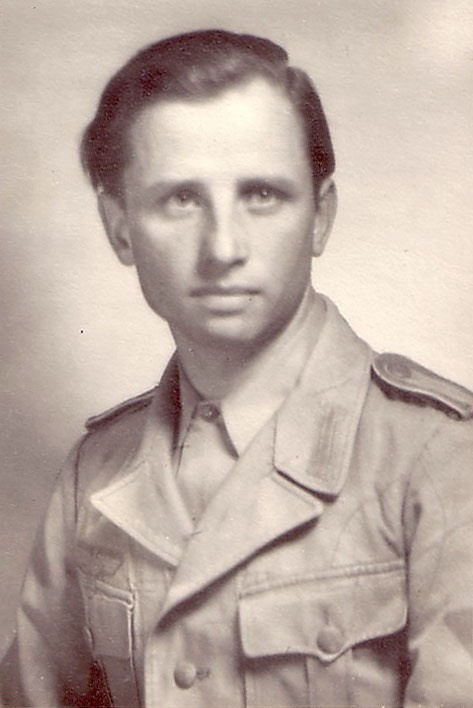February 3rd, 2012

Reinhold Pabel died on June 4th, 2008, at the age of 92, in Hamburg, where he spent much of his life. He was an antiquarian by trade, but his true story took place much earlier. He had gone to theology school with the intent of becoming a pastor, but World War II interrupted his studies; he was drafted into the Wehrmacht in 1940. After training he ended up fighting in the invasion of Russia. He served on the Eastern Front for two years, something of an achievement given the casualty rates there. He seemed to have quite a bit of luck in getting himself wounded at just the right time. The first time was at the beginning of the disastrous winter of 1941; he took a bullet through the leg. It didn’t do any permanent damage, but given the lousy state of medicine in those days, it took four months to heal. By the time he was fit to return to duty, the winter was over.
Pabel was not at all what most people think of when they think of German soldiers. He was good-natured and affable, making friends easily. Able to speak a number of languages, he was often called upon to interrogate prisoners, and he empathized with them. Time and again he discovered that, even in the midst of the most barbaric war of modern times, people would respond to humanity with humanity.
In 1943 he was transferred to the Afrika Korps, but by the time he reached Sicily, Tunis had fallen and he remained there. Fleeing across the narrow strait separating Sicily from Italy, his boat sank and he had to swim to shore, shedding his boots and clothing to do so. He then walked naked through the Italian streets to the collecting station, embarrassed but recognizing the humor in the situation.
By this time, he had been promoted to sergeant, and led a squad of young recruits. During a particularly confused bout of fighting his team lost contact with the other squads in his platoon, and wandered around in the midst of a fast-moving battle. They came across an American aid station where lay a number of American wounded. Pabel struck up a friendly conversation with an American lieutenant and they chatted amiably for half an hour before Pabel decided that it was time to move on. He declared that they were his prisoners and he would be back to pick them up later – although both he and the Americans knew that it was the Germans who were in deep trouble. The American lieutenant urged Pabel to surrender rather than risk death in a hopeless effort to get back to German lines, but Pabel’s sense of honor forbade that.
Pabel took his men through a network of irrigation canals, trying to stay hidden. But at one point they had to jump over a small dam. One by one, his charges hopped the dam to safety, but the Americans were zeroing in on their position. Pabel was the last to go, and they nailed him when he jumped. Seriously wounded, Pabel told his men to go on without him. Then he crawled back to the American aid station. He fully expected to die from his wounds, but prompt medical treatment saved his life. An American prisoner, Pabel was taken to a POW camp in America. After he recovered from his wounds, he volunteered to work on nearby farms and greatly appreciated the opportunity, because the American farmers always rewarded the German laborers with huge meals. 1944 passed peacefully and happily. But Pabel hatched a plan to escape, and he did just that. He had no intention of fighting – he just preferred to be free. His excellent English, happy disposition, and friendly ways served him well. He made it to Chicago and made a living washing dishes. He lived frugally under the alias “Phil Brick”, saving his money.
The war ended, but he had no desire to return to a war-wrecked Germany. Phil Brick lived the American dream. Through hard work and saving, he managed to scrape together enough money to buy a used-book store. He prospered. He fell in love with an American girl and married her. And then one day in 1953 two FBI agents walked into his bookstore and asked if he was Reinhold Pabel. He couldn’t deny the truth, and so they put him in jail and prepared to deport him.
At this point an old friend came to his rescue: Paul D. Lindsey, the American lieutenant he had befriended in the Italian aid station turned out to be a lawyer, and he and another American testified in support of Pabel. It was a truly crazy case: Pabel was accused of entering the USA illegally, but in fact he had entered it legally as a POW! The law was on Pabel’s side, but the Feds weren’t willing to let an escaped POW get away with it. They settled on a compromise: Pabel went back to Germany for six months to go through the formality of the waiting period, then was permitted to re-enter the USA legally. While waiting in Germany, he wrote a book relating his experiences as a German soldier and his exploits as the only successful POW escapee. That book had as its central theme Pabel’s belief that humanity could outshine the horrors of war. His war stories were not about combat and death; they were about human beings finding their common humanity across the vast gulf of war. He gave the book the title Enemies are Human.
[April 6th, 2017] Special thanks to Paul XXX, the grandson of the American lieutenant, for contacting me to correct some details of this story.
